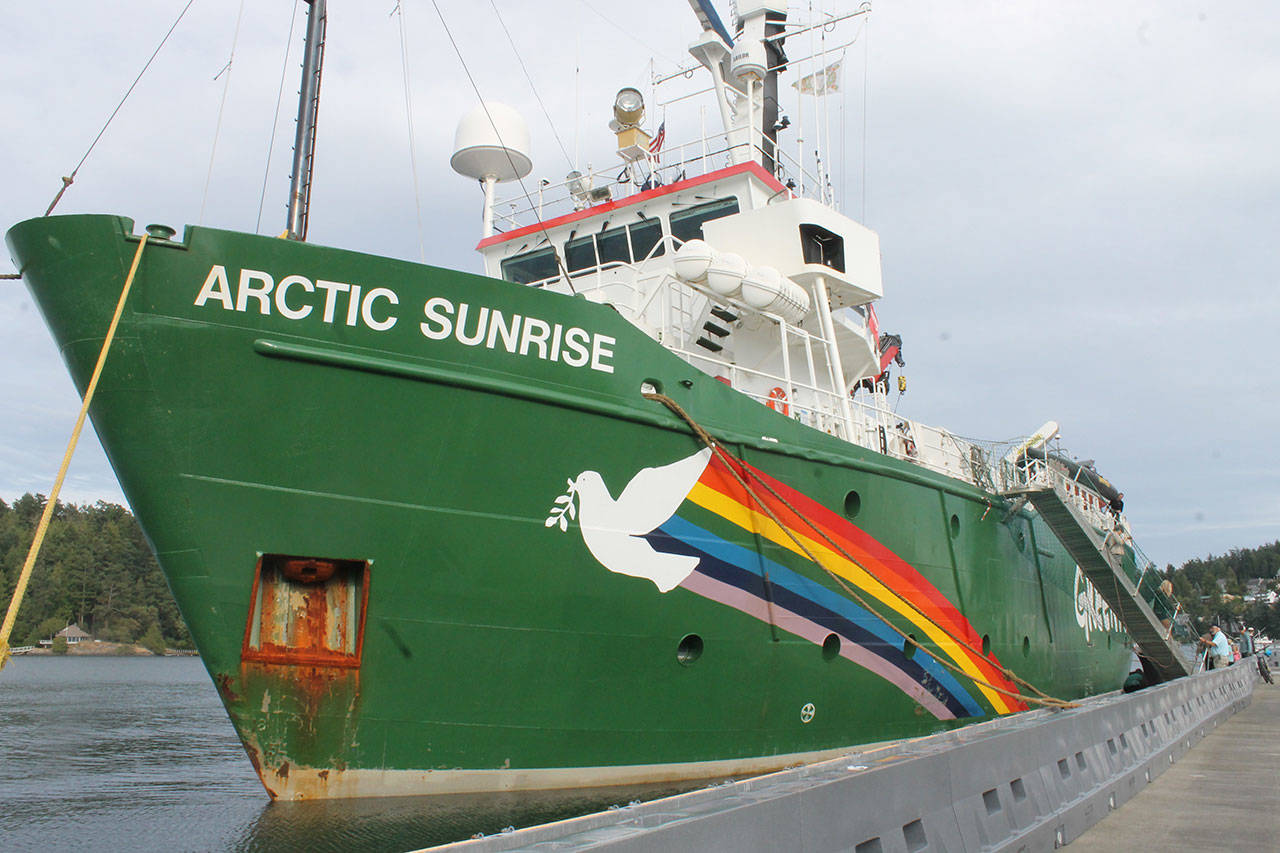To emphasize the impacts of the proposed Kinder Morgan Trans Mountain Pipeline, the Greenpeace vessel Arctic Sunrise is following the tankers’ route through the Salish Sea.
“Moments after entering what Kinder Morgan flagged as a high-risk oil zone, we saw orcas,” said Yianni Varonis, Greenpeace senior communications director. “Should there be an oil spill in this region, the endangered southern resident orcas would be gone.”
The Arctic Sunrise made a short stop on June 27 in the Port of Friday Harbor and held a reception on board the vessel for those who have worked against the pipeline. Hundreds of people attended the event which included refreshments, music, ship tours and speakers. Captain Pep Barbal, of the Arctic Sunrise and Safe Shipping members Lize Michaelson and Shaun Hubbard were presented with Orca Protector pennants from San Juan Islanders for Safe Shipping. SJISS is a comprised of a group of islanders who have been concerned about the adverse impacts to the local economy and environment due to increasing tanker traffic. To learn more about this organization, visit https://islandersforsafeshipping.org/about/. Orca Protectors is an outreach arm of SJIFSS, dedicated to education and action to help protect the environmental and economic health of the Salish Sea, according to their press release, and pennants will be available for purchase at Kings Marine in Friday Harbor and The Company Store in Roche Harbor.
Tanker traffic as a result of the pipeline is estimated to increase from five a month to approximately 34, totally over 400 tankers a year. Lovel Pratt, Friends of the San Juans Marine Protections program director, said that according to the 2015 Vessel Traffic Risk Assessment, the additional traffic would increase the risk of at least one accident in 10 years in Haro Strait and Boundary Pass with an oil spill of 660,430 gallons or more by 839 percent from the base 2015 case, which is currently about 25 percent. In the San Juan Islands, the risk of an oil spill of that same size within a ten year time spane, goes from zero percent to 44 percent.
In Washington alone, Greenpeace estimates that 23,000 fishing and 78,000 tourism jobs would be lost in the event of a spill, and it would take decades for the area to recover. According to Varonis, oil from the tar pits is heavier than crude oil, therefore, sinks faster, making it difficult to clean up. In the case of a spill from these tankers only an estimated 1 or 2 percent would be able to be cleaned up, he said.
Recently, the Canadian federal government bought the Trans Mountain Pipeline project from Kinder Morgan. According to Varonis, Kinder Morgan sold the project due to opposition from environmentalists, British Columbia’s local government and indigenous people, whose land the pipeline would cross.
“It is a testament to the power of peaceful protest that the environmental and indigenous allies forced the hand against a huge company,” Varonis said.
Nineteen-year-old Kayah George, a member of both the Tulalip and Tsleil-Waututh First Nations, has fought against pipeline projects since she was nine.
“These waters are everything to us,” George said, noting her grandparents and parents fought against such projects as well.
“It is the Tulalip belief that we must care for the Earth,” she said, adding that after making so many promises to Canada’s indigenous people, it felt like a slap in the face when Prime Minister Justin Trudeau agreed to allow the Canadian government to purchase the project. George remains optimistic the pipeline can be stopped, in part because the movement against the project has gained momentum quickly.
One of the biggest actions that can be taken to put an end to it, George explained, is to end the flow of money toward this and similar endeavors. European banking giant HSBC staff have already agreed not to invest in any tar oil projects. Encouraging other banks, investors and shareholders to do the same would effectively halt future pipeline plans. There is also a petition to urge Washington Governor Jay Inslee to take what action he can against the proposal.
“Tell your friends and neighbors,” Varonis said, adding the time to take action is now.
For info, visit prod.greenpeaceusa.info/usa/reports/tanker-superhighway.



